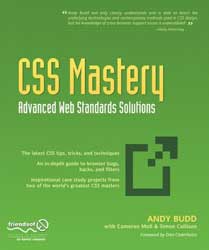Back in August, when I was researching the best book to learn CSS, I was suspicious of all the glowing comments at Amazon.com for CSS Mastery.
 I mean, they sounded too good to be true. I'm especially suspicious of reviewers who post one (and only one) comment, along with those exhorting the reader to either "Buy this book!" or "Don't buy this book!"
I mean, they sounded too good to be true. I'm especially suspicious of reviewers who post one (and only one) comment, along with those exhorting the reader to either "Buy this book!" or "Don't buy this book!"
Reviews should present the review's opinion, not try to influence purchasing decisions, cuz everyone's criteria is different (.. which is how I came to trust Nate's reviews).
Anyway, curiosity got the best of me, and I started reading CSS Mastery this week. And while some of those comments may indeed be phoney-baloney (who knows for sure?), I can now see what everybody is talking about.
Hard to describe, but it's like a light comes on in your head while reading that book. There's a *clarity* to the way concepts are presented. [Sample chapter posted here.]
I'm not very far into it, but since my initial research, I kept wondering if all the hoopla was justified. Well, it is. I especially like the way the author (from Brighton, England) gets right to the point. [I try to do that myself.]
••• today's entry continues below •••
Molly is the book's technical reviewer, and I read she can make *any* book shine. So maybe she is the reason for the sparkle that occurs in your brain while reading.
The following paragraph is an example of what I'm taking about. Notice both the stated ideal and the common sense approach »
Although the goal is to keep your code as lean and meaningful as possible, sometimes you cannot avoid adding a non-semantic div or span to display the page the way you want. If this is the case, don’t fret.
We live in a transitional period and hopefully CSS3 will give us greater control of our documents. In the meantime, realworld needs must often come before theory. The trick is knowing when to make a compromise and if you are doing it for the right reason.
Web 2.0 (the Future) » The Semantic Web
Speaking of "meaningful code," I've been researching the terms "Web 2.0," and "Semantic web," and "Ontology," because this is where people-in-the-know (such as Tim Berners-Lee, the guy who invented the web) say the web is going.
But this is a topic for another day. Large topic, about which many books have been written (such as this one, which I've skimmed), and I do not yet have a good grasp on the topic. But CSS Mastery emphsizes the concept of semantic mark-up .. so we're already headed in that direction.
The way my brain works .. is I first like to get a handle on the basic concepts & key terms, so my brain can create categories ("buckets," if you will). Later I can return to the material, and find it much easier to digest the concepts in greater detail, cuz my brain has had time to create a conceptual framework into which I can deposit the new information more rapidly.
But we all learn differently. I can power-thru just about *any* material .. but I don't enjoy learning that way (like drinking water thru a fire hose).
Speaking of learning, I've been trying out this new audio file on » Deep Learning. The jury is still out. Not sure if it helps or not. [Do I sound any smarter?]
BTW - speaking of the guy who invented the web, here is a "very short" personal history of the web I found, authored by TB-L. Very interesting, especially the part about the brain's ability to "store random associations between disparate things," which was his motivation for inventing the hyperlink, the very heart of what makes the web the web. In other words, the web was patterned after the way the brain works.
PS - Today is bro's b-day. Happy b-day, bro. Bro is a surgeon (orthopaedics) .. in Tennessee. If you need an operation, I can get you a good deal. =) He's gonna celebrate by watching Pirates of the Caribbean III.
For more along these lines, here's a Google search preconfigured for the query » andy budd css mastery book review

Comments (4)
Confidus Solutions cooperate with numerous banks and banking agents, having many years of experince. If your company requires merchant, savings or investments account - contatc us. We shall evaluate your case, and offer one or another bank depending on the type and volume of commercial activity.
Posted by Confidus Solutions | November 24, 2020 2:32 AM
Posted on November 24, 2020 02:32
Cryptocurrencies usually have no common emission and controlling bodies. No national banks or other governmental structures has any direct control over cryptocurrency emission and value. This explains why it’s value and general status are set solely by a theoretical consensus of all it’s holders. https://www.baltic-legal.com/blockchain-cryptocurrency-licence-eng.htm
Posted by Bextol Ca Hervey | March 27, 2021 4:08 PM
Posted on March 27, 2021 16:08
I do not agree with previous comment, now different countries regulate cryptos, for example it's already regulated in Poland. You can read it here https://www.pfser.com/en/cryptocurrency-license-in-poland/
Posted by Piccabu | October 26, 2022 5:21 AM
Posted on October 26, 2022 05:21
Нужна офшорная компания? Не знаете где лучше зарегистрировать офшор для торговли? Юристы UA-OFFSHORE дадут консультацию по вопросам налогообложения и применения нерезидентов в международной торговле, так же помогут открыть счет в иностранном банке для вашего предприятия. https://www.ua-offshore.com/services/registration
Posted by UA-OFFSHORE | May 31, 2024 2:19 AM
Posted on May 31, 2024 02:19